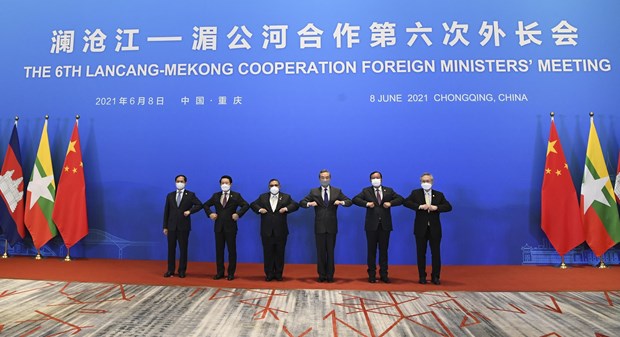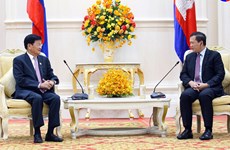Thailand proposes four approaches at MLC Foreign Ministers’ Meeting
Thai Deputy Prime Minister and Minister of Foreign Affairs Don Pramudwinai proposed four approaches to strengthen the Mekong - Lancang Cooperation (MLC) at the 6th MLC Foreign Ministers’ Meeting held in China’s Chongqing city on June 8.
 Foreign ministers of the MLC countries pose for a photo at the meeting in China’s Chongqing city on June 8 (Source: VNA)
Foreign ministers of the MLC countries pose for a photo at the meeting in China’s Chongqing city on June 8 (Source: VNA)The Thai Foreign Ministry said in a statement that at this event, Pramudwinai said he attaches importance to strengthening the Mekong - Lancang cooperation.
He urged closer cooperation in access to and production of vaccines, post-COVID economic recovery through bio-circular-green (BCG) economic growth model, digital economy, and water resources management for the sub-region to re-emerge safer, greener, and smarter.
In terms of public health, the Thai official stressed the equitable access to vaccines by all while to boost post-COVID-19 recovery, he suggested enhancing cooperation on BCG, which is an economic model that is innovation-driven, value-creating, and environmentally friendly.
As Thailand’s national agenda, BCG focuses on four major industries, including food and agriculture, energy and materials, health and medicine, and tourism and services. They are also the industries in which MLC member countries have comparative advantages, he noted.
Another approach is to promote linkages between the special economic zones in border areas and development of innovation corridors to support special economic zones and BCG industries, he said, adding that this includes the promotion of digital transformation to help build capacity and resilience for the MLC government agencies and businesses to cope with the new normal environment in a sustainable manner.
Emphasising the importance of water resources on the livelihoods of people living along the Mekong River, the official urged all MLC countries to redouble the efforts to promote practical cooperation and sustainable management of trans-boundary waters.
He underlined that MLC member countries should enhance collaboration in information sharing and early warning system on water level changes so that the people downstream could make necessary preparations in time to cope with the consequences.
Such cooperation will help strengthen the mutual trust and confidence among the MLC family and garner public support for the MLC, Pramudwinai remarked.
The establishment of the Mekong - Lancang Cooperation was suggested by Thailand in 2012 with a view to promoting sustainable development and narrowing the development gap in the Mekong - Lancang sub-region.
The MLC countries consist of Cambodia, Laos, Myanmar, Thailand, Vietnam, and China./.













